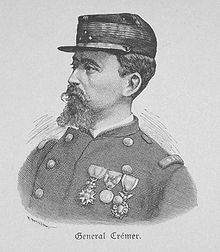Camille Crémer
Camille Crémer [ kamij kʀemɛːʀ ] (* 6. August 1840 in Sarreguemines , † 2. April 1876 ) was a French general.
Life
He joined in 1857 at the Military School of Saint-Cyr one, made the campaign in Mexico as a Lieutenant of Zuavenregiments with was 1866 Capitaine in the General Staff and stood in the Franco-German War of 1870 / 71 as adjutant of General Clinchant the 3rd Corps of the Army of the Rhine , with whom he fought at Metz and was captured at the surrender at the end of October. On his word of honor not to continue serving against Germany , he was released from captivity. He went to the delegation in Tours and received the rank of Général de division in command of a newly formed corps of 10,000 men in the east of France from mobile guards, with whose takeover he broke his word of honor.
He developed a lively activity in eastern Burgundy and demonstrated bravery and general skill in the battle at Nuits on December 18 . Ruthless and fanatical in his patriotism, he had an innocent shopkeeper from Dijon shot as a Prussian spy . He then joined Bourbaki's army and tried in vain to avoid the Germans' right flank in the Battle of the Lisaine (January 15, 1871) .
When the Eastern Army entered Switzerland , Crémer abandoned his infantry and cannons, which were destroyed, and escaped with his cavalry. The Paris Commune put him in command of the Paris armed forces, but he turned it down and left Paris. Instead, he obtained the release of General Chanzy, who had come under the control of the Commune .
The commission, which had to investigate the legality of the officer's titles awarded since September 4, 1870, only recognized him as chief de bataillon . As a result, he accepted his release with insubordinate expressions and was sentenced to one month in prison for that shooting of an innocent man in 1872. He died on April 2, 1876.
literature
- A French execution . In: The Gazebo . Issue 44, 1871 ( full text [ Wikisource ]).
| personal data | |
|---|---|
| SURNAME | Crémer, Camille |
| BRIEF DESCRIPTION | French officer |
| DATE OF BIRTH | August 6, 1840 |
| PLACE OF BIRTH | Sarreguemines |
| DATE OF DEATH | April 2, 1876 |
